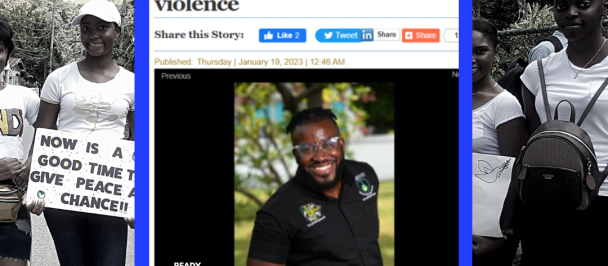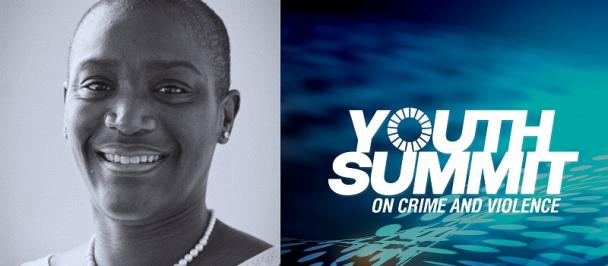Remarks
UNDP Resident Representative Denise E Antonio
Opening Ceremony Youth Summit on Crime & Violence
Tuesday 21 September – World Peace Day
2 to 2:30 p.m.
Salutations
- Deputy Prime Minister and Minister of National Security Dr the Hon Horace Chang
- Minister of State, Ministry of Education, Youth and Information, Hon Robert Nesta Morgan
- Director General, Planning Institute of Jamaica (PIOJ), Dr Wayne Henry
- Director and Representative, UNESCO Caribbean Cluster Office, Saadia Sanchez Vegas
- RISE Life Management Services’ Executive Director, Sonita Abrahams
- Chairman of the PSOJ’s National Security & Justice committee, Lt. Commander George Overton
- Development partners
- Youth Leaders, Delegates, and members of the media
Happy International Day of Peace, and welcome to the two-day virtual Youth Summit on Crime and Violence, an event inspired, planned and led by youth leaders with our guidance and facilitation.
On this special day, amid global calls for peace, are sobering reminders of why we must persist in intergenerational transfer of knowledge and skills in pursuit of sustainable development goal 16: Peace, Justice and Strong Institutions.
UNDP's 2021 Regional Human Development Report confirms that Latin America and the Caribbean is the most violent region in the world, accounting for one third of global homicides although it is home to only 9% of the global population. The report also established for the first time, that greater levels of income inequality are associated with increases in homicide and crime victimization rates, and that the effect of inequality on homicides seems stronger in the case of male victims.
In Jamaica, available data indicates that crime and violence disproportionately impact youths. Male youth between the ages of 16 to 24 are at the epicentre of violent crimes. Male youth are arrested, jailed, and murdered at twice the rate of the general population, while women and girls are the main victims of sexual violence.
Yet, rarely do young people lead the interventions designed to address this issue.
Addressing systemic inequalities, especially those that marginalize youth is therefore a critical input into the comprehensive approach being taken to reducing crime and violence regionally and nationally. As development partners we have committed to strengthening mechanisms to enable youth participation in decision making and actions to address Citizen Security & Safety; and to empowering youth to implement innovative & sustainable solutions for Citizen Security and Safety. The Amplifying Youth Voice and Action Project, is a practical example of UNDP’s commitment to meaningful youth engagement and empowerment.
The youth leaders and delegates here today are asking why we are consulting them but not including them in the implementation phase? This youth summit is again a demonstration of their persistent call for stronger youth participation because they do have insight, networks and non-traditional ways to contribute.
The United Nations Security Council moved to address this global anomaly in 2015. They adopted the groundbreaking Resolution 2250, calling for young people play a role in the prevention and resolution of conflict through participation, protection, prevention, partnership and disengagement and reintegration.
‘The Missing Peace’, a 2018 Independent Progress Study on Youth, Peace and Security requested by UN resolution 2250 concluded that if the right investments in youth are made, and their peacebuilding work is recognized and nurtured, societies may reap a peace dividend. I reiterate the report’s calls for:
• Investing in young people’s capacities, agency and leadership through substantial funding support, network-building and capacity-strengthening.
• Transforming the systems that reinforce exclusion to address the structural barriers limiting youth participation in peace and security. AND
• Prioritizing partnerships and collaborative action, where young people are viewed as equal and essential partners for peace
Over the next two days, youth leaders will make the case that Ending Crime Needs YOUth – meaning You, Me, all of us, partnering strategically with young people for greater impact.
This Youth Summit demonstrates that young people have the capacity and capability to play a larger role in designing and implementing crime prevention and peacebuilding strategies; today’s event is a demonstration of the possibilities if we provide them with the space to innovate. We believe this to be a most fitting time to introduce the work of a remarkable generation of young leaders who are working in tandem with national development aspirations for a peaceful and just society.
Throughout the Summit we will showcase the work of 11 youth groups, ten of whom have each been provided with $1.5 Million JMD grants by UNDP to innovate and lead citizen security and safety programmes in crime hotspots under our Amplifying Youth Voice and Action project. Importantly, though this phase of AYVA project serves as a pilot, UNDP is committed to mobilizing additional resource to upscale a select number of the youth incubator projects to replicate successes and increase knowledge sharing amongst youth nationally.
To ensure sustainability of the gains made through the AYVA Project, and other similar initiatives being implemented locally, I urge the government and development partners to consider establishing a national Knowledge Sharing and Empowerment Network on peace, crime prevention and citizen safety and security for youth organizations. The network would serve to systematize best practices in youth-led community-based crime prevention methods and provide mentorship, resources, crime prevention micro grant funding and other opportunities to youth-led organisations. The network could be a product of institutional arrangements already in place through existing collaboration between the Ministry of National Security and the Ministry of Education Youth and Information and would be further strengthened by the inclusion of select private and civil society organizations. UNDP stands ready to support such an undertaking.
Over the next two days, youth leaders will issue their own calls to action as they seek to bring their resources and talents to the table. University students will share new ideas for advancing citizen safety and security through the Development Challenge competition. We must listen, learn, remain open and be responsive to the possibilities which these new ideas may provide.
We commend the Planning Institute of Jamaica, UNESCO Caribbean, Ministry of Education, Youth and information, Ministry of National Security, and other key stakeholders such as Private Sector Organization of Jamaica and RISE Life Management Services for partnering with us in this important process of discovery and multigenerational mentorship.
To the presenters and delegates of the Youth Summit, I hope your experience is rewarding and productive. Let’s us all continue to support Jamaica in playing her part in advancing the welfare of the whole human race, ensuring no one is left behind.
Thank you.

 Locations
Locations


